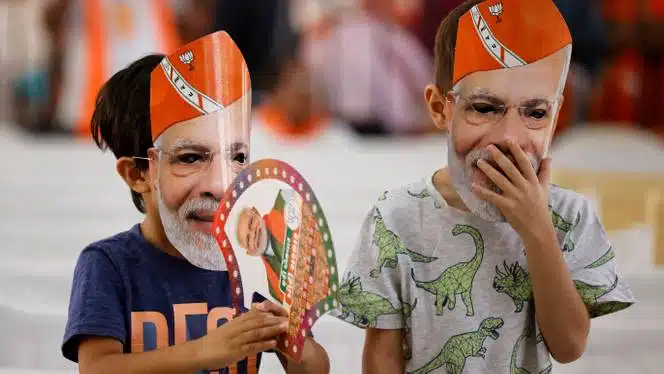Deepfakes are appearing in elections all over the world, and artificial intelligence (AI) is the newest threat of the year. Program advancements have made it easier than ever to create lifelike images, videos, or audio.
Recently, false information regarding voting procedures, allegations that the election would be manipulated without proof, and calls for violence against Muslims in India have all been shared online in India.
The lax enforcement of internet companies’ regulations, according to researchers tracking hate speech and misinformation in India, has made the perfect environment for damaging content that has the potential to incite violence, sway public opinion, and leave millions of voters unsure of what to believe.
“A non-discerning user or regular user has no idea whether it’s someone, an individual sharing his or her thoughts on the other end, or is it a bot?” 49-year-old voter Rekha Singh said to The Associated Press. Singh expressed concern that voters’ perceptions of reality are distorted by social media algorithms. She remarked, “So you are biased without even realizing it.”
India’s extensive voting system sticks out in a year full of significant elections. The nation with the largest population in the world speaks more than 100 languages, has the most WhatsApp users, and has the most YouTube subscribers. The election, which takes place until June, offers nearly 1 billion voters the opportunity to cast a ballot.
Tech giants like Google and Meta, the owners of Instagram, Facebook, and WhatsApp, claim to be fighting abusive and misleading content while assisting voters in locating trustworthy sources. Their claims, however, seem hollow to scholars who have long monitored misinformation in India, given years of ineffective enforcement and “cookie-cutter” solutions that ignore the country’s linguistic, religious, geographic, and cultural diversity.
Deepfakes created by AI
The group’s research, along with that of another organization, India Civil Watch International, revealed that all of Meta’s posts and political advertisements contained misogynistic remarks about female candidates, Hindu nationalist narratives, anti-Muslim hate speech, and calls for violence against political opponents.
Earlier this year, nearly 65 million times throughout 90 days, the advertisements were viewed. Their combined cost exceeded $1 million.
In defense of its work on international elections, Meta disputes the results of the study on India, pointing out that it has increased its collaboration with independent fact-checking groups in advance of the election and that it has staff members ready to go anywhere in the world in the event that its platforms are used improperly to disseminate false information. Regarding the election in India, Meta’s president of global affairs, Nick Clegg, stated: “It’s a huge, huge test for us.”
“In India, we have months and months and months of preparation,” he recently stated in an interview with The Associated Press. Our teams are hard at work all day and night. In India, we have fact-checkers who speak many languages. A system of 24-hour escalation is in place.
The company that owns YouTube, Google, criticized the study and stated that it has several policies in place to identify and block ads that do not follow its guidelines. Before they could be seen and blocked, Global Witness took down the advertisements, according to the business.
Google released a statement saying, “Our policies, which we enforce in several Indian languages, explicitly prohibit ads making demonstrably false claims that could undermine participation or trust in an election.” The business mentioned its affiliations with fact-checking organizations as well.
Since it’s now easier than ever to create lifelike images, videos, or music, artificial intelligence (AI) is the newest threat of the year. Artificial intelligence deepfakes are showing up in election results everywhere from Bangladesh to Moldova.
The creator of Muonium AI, Senthil Nayagam, feels that there is a rising market for deepfakes, particularly among politicians. He received multiple questions concerning employing AI to create political films in the lead-up to the election. Without a doubt, there is a market for this, he stated.
SOURCE: TRTWORLD






